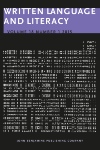
Written Language and Literacy
Scope & Guideline
Bridging Theory and Practice in Written Language Research
Introduction
Aims and Scopes
- Exploration of Writing Systems:
The journal delves into the nature, evolution, and typology of writing systems across different languages, examining their systematic characteristics and cultural significance. - Literacy Development and Education:
Research on literacy practices, particularly in educational contexts, is a core aspect, focusing on how writing and reading skills develop among diverse populations, including children and non-native speakers. - Interdisciplinary Approaches:
The journal encourages interdisciplinary research that connects linguistics, psychology, education, and cultural studies to provide a holistic understanding of written language and literacy. - Diversity and Typology of Orthographies:
A consistent focus on the diversity of orthographic systems and their implications for literacy practices, especially in multilingual and multicultural settings. - Impact of Social Factors on Literacy:
Investigating how social dynamics and contexts influence literacy practices and spelling conventions, particularly in informal writing scenarios.
Trending and Emerging
- Impact of Technology on Writing Practices:
There is a growing interest in understanding how digital communication and social media influence writing conventions and literacy skills, particularly among younger populations. - Culturally Responsive Literacy Practices:
Papers focusing on culturally relevant and responsive approaches to literacy education have emerged, highlighting the importance of inclusivity in teaching diverse writing systems. - Research on Emergent Literacy Skills:
An increasing number of studies are dedicated to understanding how early literacy skills develop, particularly in the context of diverse family literacy practices during significant events like the COVID-19 pandemic. - Argumentative and Source-Based Writing:
There is a notable trend towards research on argumentative writing skills, especially in higher education contexts, emphasizing the need for effective source-based writing instruction. - Multilingual and Bilingual Literacy Development:
Emerging themes include the exploration of literacy development among bilingual and multilingual speakers, focusing on how different language backgrounds influence writing skills.
Declining or Waning
- Traditional Spelling Studies:
Research specifically centered on traditional spelling patterns and rules has seen a decrease, possibly as more focus shifts toward innovative approaches in literacy and the impact of technology. - Historical Linguistics of Writing Systems:
Papers exploring the historical development of specific writing systems have become less frequent, indicating a potential waning interest in purely historical analyses in favor of contemporary applications. - Narrow Psycholinguistic Studies:
While psycholinguistics remains relevant, studies that concentrate narrowly on isolated psycholinguistic phenomena without broader educational implications seem to be less common, as the journal seeks more integrative approaches. - Formalized Taxonomies of Writing Systems:
Proposals for rigid taxonomies of writing systems have diminished, suggesting a move towards more flexible and context-sensitive frameworks that accommodate diversity and complexity. - Prescriptive Approaches to Literacy Education:
There is a noticeable decline in prescriptive methodologies in literacy education, as the field increasingly embraces more adaptive and responsive teaching strategies.
Similar Journals
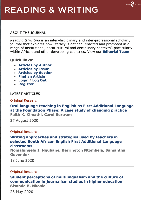
Reading & Writing-Journal of the Reading Association of South Africa
Advancing Knowledge in Literacy and EducationReading & Writing - Journal of the Reading Association of South Africa is a distinguished open access journal published by AOSIS, focusing on pivotal research within the fields of education and linguistics. Established to promote literacy and reading initiatives, this journal serves as an invaluable platform for scholars and educators aiming to enhance literacy practices in the South African context and beyond. With an ISSN of 2079-8245 and e-ISSN 2308-1422, it enables a wide reach since its initiation as an open access publication in 2010, breaking barriers for the dissemination of knowledge. Its notable Q2 placement in Linguistics and Language and Q3 in Education underscores its relevance and rigor, reflecting a high standard in scholarship as per the 2023 metrics. Further, it holds commendable Scopus rankings across several categories, including a 75th percentile in Language and Linguistics, indicating its strong standing within the academic community. This journal not only allows for unrestricted access to cutting-edge research but also encourages collaboration and dialogue among researchers, educators, and practitioners, ultimately aiming to foster a deeper understanding of literacy development in diverse educational settings.
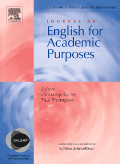
Journal of English for Academic Purposes
Innovating Approaches to Academic CommunicationJournal of English for Academic Purposes, published by ELSEVIER, is a premier peer-reviewed journal dedicated to the study and application of the English language within academic contexts. With an impressive impact factor indicative of its significance in the field, this journal is recognized in the Q1 category for both Education and Linguistics and Language, reflecting its high-quality contributions. It ranks 28th among 1088 in Arts and Humanities (Language and Linguistics) and is featured in the top percentile of Social Sciences. As an essential publication for researchers, educators, and language practitioners, it serves as a platform for innovative research that enhances academic English proficiency and teaching methodologies. With its commitment to exploring the intersection of language and education, the Journal of English for Academic Purposes is a vital resource for those aiming to advance their knowledge and practice in English language education. This journal has been actively contributing to the academic discourse since its inception in 2002 and continues to be influential in shaping the future of English language studies and pedagogy.

JOURNAL OF LITERACY RESEARCH
Bridging gaps in literacy knowledge and practice.JOURNAL OF LITERACY RESEARCH is a leading scholarly journal published by SAGE Publications Inc., dedicated to advancing the field of literacy studies through rigorous research and critical analysis. With an impact factor reflecting its high-quality contributions, this journal has achieved Q1 rankings in both Education and Linguistics and Language, positioning it among the top-tier publications in these fields. The journal has a comprehensive scope that includes various aspects of literacy research, bridging theoretical frameworks and practical applications. Researchers, educators, and students will find valuable insights in its articles, addressing critical issues from emergent literacy to adult education in diverse contexts. Available as an open access resource, the JOURNAL OF LITERACY RESEARCH ensures that cutting-edge research is accessible to a global audience, fostering an inclusive environment for disseminating knowledge and supporting literacy initiatives worldwide. For more information, visit the journal's page at [SAGE Publications](https://journals.sagepub.com/home/jlr).
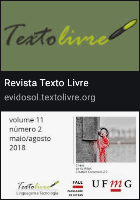
Texto Livre-Linguagem e Tecnologia
Fostering Open Dialogues in Language and Technology.Texto Livre-Linguagem e Tecnologia is a prominent academic journal published by the Federal University of Minas Gerais, Faculty of Letters, specializing in the interdisciplinary domains of language, technology, and communication. Since its establishment, the journal has embraced an Open Access model, fostering unrestricted dissemination of research findings. With an ISSN of 1983-3652, it aims to bridge theoretical insights and practical applications in linguistics and technology, thereby enriching scholarly dialogues worldwide. The journal's recent classifications in the 2023 Category Quartiles highlight its relevance, achieving Q3 in Communication, Q4 in Computer Science Applications, and Q2 in Linguistics and Language. Additionally, it has earned respectable Scopus rankings, placing it within the 71st percentile for Language and Linguistics in the Arts and Humanities. This positions Texto Livre as a vital resource for researchers, professionals, and students keen on exploring the dynamic interplay between language and technology. By engaging with cutting-edge research, contributors and readers alike can shape the future discourse in these critical fields.
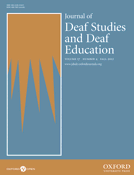
Journal of Deaf Studies and Deaf Education
Illuminating diverse perspectives in hearing impairment research.The Journal of Deaf Studies and Deaf Education, published by Oxford University Press, is a leading scholarly resource that focuses on the multifaceted realm of deaf studies, encompassing linguistic, psychological, educational, and social dimensions related to deafness and hearing impairments. With an impactful presence in both the Education (Q2) and Speech and Hearing (Q2) categories, this journal serves as a critical platform for disseminating innovative research and fostering discourse among professionals, educators, and scholars from across the globe. The journal is indexed in high-reputation databases and ranks prominently within the Scopus rankings, indicating its relevance and influence in the fields of Health Professions and Social Sciences. Published quarterly, the journal facilitates comprehensive access to groundbreaking studies and theoretical advancements that aim to improve educational methodologies and outcomes for deaf and hard-of-hearing individuals. As it celebrates two decades of impactful publication from 2004 to 2024, the Journal of Deaf Studies and Deaf Education continues to champion the scholarly pursuits aimed at enhancing understanding and support for the deaf community.

TESL Canada Journal
Fostering Excellence in Language Education ResearchTESL Canada Journal, published by TESL Canada, serves as a vital resource for researchers, educators, and practitioners in the field of English as a Second Language (ESL) and applied linguistics. With its commitment to advancing scholarship and best practices in language education, this esteemed journal fosters a platform for the dissemination of high-quality research and innovative pedagogical approaches. Although it operates without open access, its comprehensive articles and reviews offer valuable insights into current trends and challenges faced by ESL educators across Canada and internationally. The journal is dedicated to promoting a deeper understanding of language acquisition processes and instructional methodologies, contributing significantly to the professional development of its readership. Located in Burnaby, Canada, the journal aims to bridge the gap between theory and practice, making it an indispensable source for educators and researchers looking to enhance their expertise in ESL education.

RESEARCH IN THE TEACHING OF ENGLISH
Empowering Educators with Groundbreaking ResearchResearch in the Teaching of English is a premier academic journal published by the National Council of Teachers of English, dedicated to advancing the methodologies and practices in the field of English language education. With a robust ISSN of 0034-527X and e-ISSN of 1943-2348, the journal has carved a niche for itself by consistently presenting cutting-edge research that informs and enhances teaching efficacy in diverse educational contexts. Spanning publication periods from 1996 to 2001 and from 2004 to 2024, it serves as a pivotal resource for educators and researchers. Recognized for its impact, the journal currently holds a Q2 classification in Education and a Q1 in Linguistics and Language, reflecting its significance in academic discourse. With commendable Scopus rankings within the top percentiles in both Arts and Humanities and Social Sciences, it remains an essential platform for scholarly discussion aimed at improving English language teaching methodologies. Join a community of professionals devoted to enriching language education through innovative research contributions.
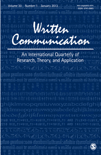
WRITTEN COMMUNICATION
Transforming Perspectives on Writing and CommunicationWRITTEN COMMUNICATION is a premier interdisciplinary journal published by SAGE Publications Inc, dedicated to advancing the understanding of communication through writing. With a strong reputation in the field, this journal holds an impressive impact factor, reflecting its significant contribution to the realms of both Communication and Literature and Literary Theory, where it proudly ranks in the top quartile (Q1) according to the 2023 category rankings. The journal's rigorous scholarly articles offer insights into the theoretical, practical, and sociocultural dimensions of written communication, making it an essential resource for researchers, professionals, and students alike. With coverage spanning from 1984 to 2024, WRITTEN COMMUNICATION promotes critical discussions and innovative perspectives, shaping the landscape of writing studies. For those interested in exploring the complexities of writing as a communicative act, this journal serves as a vital platform for academic discourse and discovery.
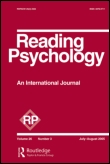
Reading Psychology
Bridging Psychology and Literacy for Better LearningReading Psychology, published by Routledge Journals, Taylor & Francis Ltd, is an esteemed journal dedicated to exploring the multifaceted relationship between reading processes and psychological principles. Since its establishment in 1979, this journal has provided a crucial platform for researchers, educators, and psychologists, addressing pivotal themes in Developmental and Educational Psychology, Education, and Linguistics and Language. With a commendable impact factor and a robust ranking within Scopus across multiple categories, including Q1 in Linguistics and Language, Reading Psychology plays an indispensable role in advancing scholarly discourse. Although it currently does not provide Open Access options, it remains a vital source of innovative research that informs theory and practice. The journal aims to cultivate a deeper understanding of reading behaviors, foster interdisciplinary collaboration, and ultimately enhance educational techniques, making it essential reading for anyone committed to the study of reading and cognition.
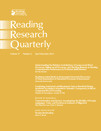
READING RESEARCH QUARTERLY
Advancing literacy through rigorous research.READING RESEARCH QUARTERLY is a premier academic journal dedicated to advancing the understanding of reading research within the domains of educational psychology and literacy development. Published by Wiley, this journal has been a vital resource for researchers, educators, and practitioners, featuring empirical studies, theoretical papers, and comprehensive reviews since its inception. With a remarkable impact factor and consistently ranked in the Q1 quartile for both Developmental and Educational Psychology and Education, it stands out as an authoritative source in the field. Notably, it possesses a strong international presence, evidenced by its Scopus rankings, sitting in the top 3% for educational social sciences and within the top 5% for developmental psychology. Although currently not offering Open Access, the journal ensures that its contributions are accessible through institutional subscriptions. By linking theoretical frameworks with practical applications, READING RESEARCH QUARTERLY serves as an essential platform for fostering innovation and collaboration among scholars and practitioners aiming to enhance literacy education and understanding.